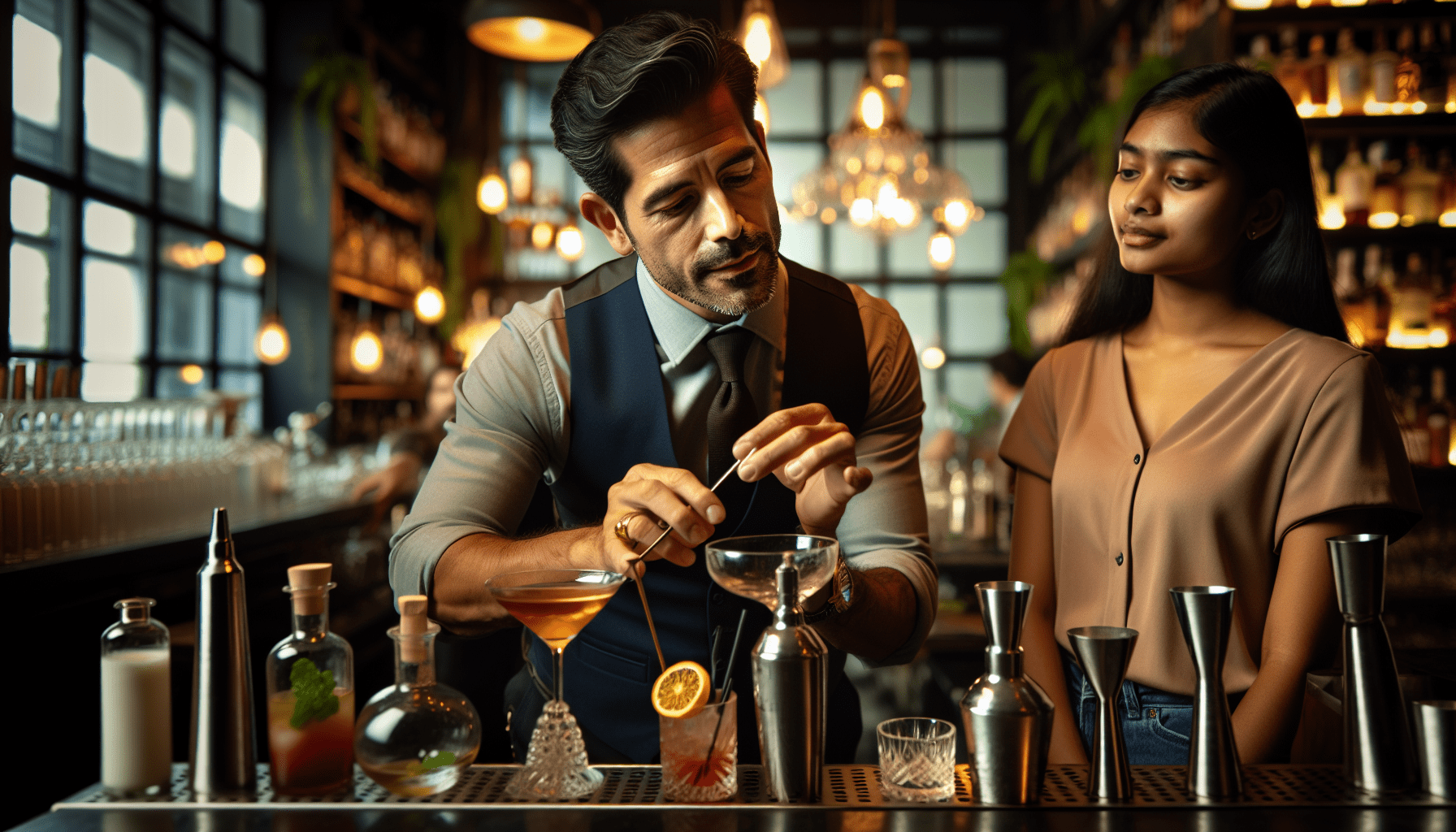Whether you’re running a trendy speakeasy or a bustling neighborhood bar, providing exceptional customer service is key to keeping patrons coming back for more. In this article, we will explore effective strategies for training bartenders to deliver a superior customer experience. From mastering the art of multitasking to honing their communication skills, bartenders play a crucial role in creating a welcoming atmosphere and ensuring that every guest leaves satisfied. So, grab a drink and let’s dive into the world of bartender training!
Creating a Culture of Exceptional Customer Service
Establishing clear expectations
To create a culture of exceptional customer service, it is important to establish clear expectations from the beginning. As a bartender, you should clearly communicate to your staff what is expected of them in terms of customer service. This includes greeting customers with a smile, being attentive to their needs, and providing prompt and efficient service. By setting clear expectations, you create a standard for your team to follow and ensure that every customer receives the highest level of service.
Leading by example
One of the most effective ways to instill exceptional customer service is by leading by example. As a bartender, you are not only responsible for serving drinks but also for setting the tone of the establishment. By consistently demonstrating exceptional customer service in your own interactions with customers, you show your staff what is expected of them. Your attitude, professionalism, and attentiveness will set the standard for the entire team, encouraging them to provide the same level of service.
Providing ongoing feedback
Training doesn’t end after the initial instruction. It is essential to provide ongoing feedback to your bartenders to help them grow and improve their customer service skills. Regularly observe their interactions with customers and provide constructive feedback on areas where they can improve. This can include specific actions or behaviors to focus on, such as active listening, maintaining a positive attitude, or upselling techniques. By providing ongoing feedback, you create a learning environment that fosters continuous improvement and helps your bartenders deliver exceptional customer service consistently.
Product Knowledge and Skills
Understanding various alcoholic beverages
To provide exceptional customer service, bartenders must have a thorough understanding of the various alcoholic beverages they offer. This includes knowledge of different types of spirits, wines, and beers, as well as their characteristics and flavor profiles. By familiarizing themselves with the varieties of alcoholic beverages available, bartenders can confidently guide customers in selecting the right drink to suit their preferences.
Developing mixology skills
A key aspect of exceptional customer service is the ability to craft delicious and well-balanced cocktails. Bartenders should invest time and effort in developing their mixology skills. This includes learning the techniques of measuring and mixing ingredients, as well as experimenting with different combinations and flavors. By honing their mixology skills, bartenders can create unique and memorable drinks for their customers, enhancing their overall experience.
Learning about garnishing and presentation
In addition to the taste of the drink, the visual appeal is also important in delivering exceptional customer service. Bartenders should learn about garnishing techniques and presentation skills to create visually stunning cocktails. This can include using fresh fruits, herbs, or creative garnishes to enhance the aesthetics of the drink. By paying attention to the details of garnishing and presentation, bartenders can create an elevated experience for their customers, leaving a lasting impression.

Effective Communication and Interpersonal Skills
Active listening
Active listening is a fundamental skill for providing exceptional customer service. Bartenders should attentively listen to customers’ orders and requests, ensuring that they understand their preferences and any special instructions. By actively listening, bartenders can prioritize customer needs, personalize their recommendations, and make the customers feel valued and understood.
Verbal and non-verbal communication
In addition to active listening, bartenders should also focus on effective verbal and non-verbal communication. This includes using clear and concise language when interacting with customers, speaking confidently, and maintaining good eye contact. Non-verbal cues such as facial expressions and body language also play a significant role in communication. By being aware of their own non-verbal communication and paying attention to customers’ cues, bartenders can establish a positive and comfortable atmosphere for effective communication.
Conflict resolution
Occasionally, bartenders may encounter customers who are unhappy or dissatisfied with their experience. The ability to handle conflicts and resolve customer complaints is crucial in providing exceptional customer service. Bartenders should be trained in conflict resolution techniques, such as remaining calm and composed, actively listening to the customer’s concerns, and finding appropriate solutions to resolve the issue. By effectively resolving conflicts, bartenders can turn negative situations into positive experiences and leave customers satisfied.
Building Rapport and Upselling
Recognizing regular customers and their preferences
Building rapport with customers is an essential aspect of exceptional customer service. Bartenders should strive to recognize regular customers and remember their preferences, such as their favorite drink or preferred brand. By acknowledging their familiarity, bartenders can make customers feel valued and create a personalized experience.
Suggestive selling techniques
Upselling is a valuable skill that bartenders can use to enhance customer satisfaction and increase revenue. By suggesting additional items or upgrades, bartenders can guide customers towards premium products that they may enjoy. However, it is important to use suggestive selling techniques ethically and focus on providing genuine recommendations based on the customers’ preferences, rather than pushing unnecessary products.
Upselling premium products
In addition to suggestive selling, bartenders should be knowledgeable about premium and specialty products. This includes high-end spirits, rare wines, or exclusive cocktails. By highlighting these premium offerings to customers, bartenders can provide a unique and elevated experience, catering to those seeking something special. This can also contribute to increasing the average check and revenue for the establishment.

Time Management and Efficiency
Organizing the bar area
A well-organized bar area is essential for providing exceptional customer service. Bartenders should ensure that their workstations are clean, properly stocked, and efficiently arranged. This includes organizing glassware, garnishes, and equipment in a logical and accessible manner, making it easier to prepare drinks quickly and efficiently.
Speed of service
One of the key factors in exceptional customer service is providing prompt and efficient service. Bartenders should focus on developing their speed and efficiency in preparing drinks, while still maintaining quality. By streamlining their workflow, minimizing distractions, and practicing efficient techniques, bartenders can serve customers quickly and meet their expectations.
Multitasking
The ability to multitask is a valuable skill for bartenders to provide exceptional customer service, especially during busy periods. Bartenders should be able to juggle multiple tasks simultaneously, such as taking orders, preparing drinks, and serving customers, without compromising the quality of service. By effectively managing their time and prioritizing tasks, bartenders can ensure that customers receive timely and efficient service.
Handling Difficult Customers
Remaining calm and professional
Difficult customers are an inevitable part of the service industry, and handling them requires a calm and professional approach. Bartenders should be trained to remain composed, regardless of the customer’s behavior or attitude. By staying calm and professional, bartenders can defuse tense situations and maintain a positive atmosphere in the establishment.
Dealing with intoxicated individuals
Intoxicated customers can present unique challenges to bartenders. It is crucial to be able to identify signs of intoxication and know the appropriate actions to take. Bartenders should be trained on strategies for handling intoxicated individuals, which may include limiting their alcohol consumption, offering alternative non-alcoholic options, or even refusing service if necessary. Bartenders play a critical role in promoting responsible alcohol service and ensuring the safety of both customers and the establishment.
Resolving complaints
Customer complaints are opportunities to improve and provide exceptional customer service. Bartenders should be equipped with the skills to handle complaints effectively, such as actively listening to the customer’s concerns, empathizing with them, and taking appropriate actions to resolve the issue. By addressing complaints promptly and satisfactorily, bartenders can turn a negative experience into a positive one, leaving customers impressed with the level of service provided.

Responsible Alcohol Service
Knowledge of legal drinking age and ID requirements
Bartenders must be knowledgeable about the legal drinking age and ID requirements in their jurisdiction. This includes understanding the legal age at which individuals can consume alcohol, as well as the types of identification that are acceptable for age verification. By ensuring compliance with these regulations, bartenders contribute to responsible alcohol service and help maintain a safe and legal environment for customers.
Recognizing signs of intoxication
Bartenders should be trained to recognize the signs of intoxication in customers. This includes observing their behavior, speech, and coordination to determine if they are consuming alcohol at a responsible pace. By identifying signs of intoxication, bartenders can intervene appropriately to prevent overconsumption and promote the well-being of the customer.
Cutting off intoxicated customers
In some instances, bartenders may need to make the difficult decision to cut off service to an intoxicated customer. This decision should be made responsibly and in adherence to legal requirements. Bartenders should be trained to handle such situations with tact and empathy, while prioritizing the safety and well-being of the individual and those around them.
Attention to Detail
Maintaining cleanliness and hygiene
Exceptional customer service prioritizes cleanliness and hygiene in the bar area. Bartenders should consistently maintain a clean and tidy environment by promptly cleaning spills, regularly sanitizing surfaces, and properly disposing of waste. By paying attention to cleanliness and hygiene, bartenders create a pleasant and comfortable atmosphere for customers, which contributes to an exceptional experience.
Checking for quality in drinks
Bartenders should have a keen eye for quality and ensure that every drink they serve meets the highest standards. This includes checking for proper measurements, correct ingredients, and consistent preparation techniques. By consistently delivering drinks of the utmost quality, bartenders show their dedication to exceptional customer service and enhance the overall experience.
Proper glassware and garnish presentation
The presentation of drinks plays a significant role in customer satisfaction. Bartenders should be meticulous in using appropriate glassware for each type of drink and ensuring that garnishes are fresh, attractive, and properly placed. By paying attention to these details, bartenders can elevate the visual appeal of the drinks and create a memorable experience for customers.

Problem-Solving and Decision Making
Quick thinking in challenging situations
Bartenders often encounter challenging situations that require quick thinking and problem-solving skills. Whether it’s a customer with a specific request, equipment malfunctioning, or time constraints, bartenders should be able to think on their feet and find effective solutions. By demonstrating their ability to adapt and problem-solve, bartenders can ensure that customers’ needs are met efficiently and effectively.
Adaptability to changing requests
Customer preferences can vary greatly, and bartenders must be adaptable to accommodate different requests. This may involve modifying recipes, adjusting flavors, or suggesting alternatives based on the customer’s preferences. By being flexible and adaptable, bartenders can provide personalized and exceptional customer service, catering to individual tastes.
Making informed judgments
Bartenders are often faced with decisions that require them to exercise good judgment. This can include determining when to refuse service to an intoxicated customer, prioritizing tasks during busy periods, or deciding how to handle customer complaints. By making informed judgments based on their training and experience, bartenders can ensure that their actions align with the principles of exceptional customer service.
Teamwork and Collaboration
Supporting other staff members
Exceptional customer service is not solely the responsibility of bartenders—it requires teamwork and collaboration. Bartenders should actively support and assist other staff members, such as servers or bussers, to ensure smooth operations and a positive guest experience. By cooperating and helping one another, bartenders contribute to a cohesive team that delivers exceptional service collectively.
Assisting during busy periods
Busy periods can be challenging, but they also present opportunities for bartenders to shine. Bartenders should be willing to step up and take on additional responsibilities during peak times, such as helping with beverage preparation or expediting drink orders. By actively assisting during busy periods, bartenders play a vital role in maintaining efficiency and providing exceptional service even in demanding situations.
Maintaining a positive work environment
A positive work environment is essential not only for the well-being of the staff but also for delivering exceptional customer service. Bartenders should contribute to a positive atmosphere by fostering a supportive and respectful environment. This can include maintaining open communication, encouraging teamwork, and recognizing and appreciating the efforts of their colleagues. By creating a positive work environment, bartenders set the foundation for exceptional customer service.
In conclusion, training bartenders for exceptional customer service involves establishing clear expectations, leading by example, and providing ongoing feedback. It also requires developing product knowledge and skills, effective communication and interpersonal skills, building rapport and upselling techniques, time management and efficiency, handling difficult customers, responsible alcohol service, attention to detail, problem-solving and decision-making, and teamwork and collaboration. By focusing on these aspects of training, bartenders can deliver exceptional customer service and create a welcoming and memorable experience for every customer they serve.
